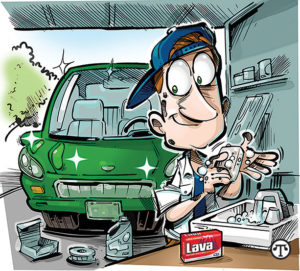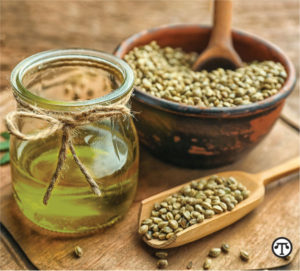Health, Home & Family
 (NAPSI)—April is Car Care Month—bringing attention to the importance of preventative car maintenance. It’s the perfect time for you and your mechanic to perform a checkup on your vehicle after snow, rain and cooler temperatures have taken their toll.
(NAPSI)—April is Car Care Month—bringing attention to the importance of preventative car maintenance. It’s the perfect time for you and your mechanic to perform a checkup on your vehicle after snow, rain and cooler temperatures have taken their toll.
Change Oil, Fluids and Air Filter
Professional mechanics recommend changing your oil every 5,000−10,000 miles to keep the engine running smoothly. Check the owner’s manual for instructions before you get started.
Mechanics also recommend replacing your vehicle’s air filter at least once a year. Check your vehicle’s instruction manual to locate the filter, open its case and review how it’s positioned. Remove the old air filter and insert the new one in the same position, before closing the metal clips.
If you don’t feel comfortable changing your own oil and air filter, your mechanic can change them for you. While you’re there, also have your power steering, brake, transmission and windshield washer fluid levels checked. Continue reading
 (NAPSI)—As your wisdom grows with age, so can the number of pill bottles in your medicine cabinet. For those “young-at-heart” seniors, sticking to healthy habits is the key to aging well. With some simple steps, you can keep a healthy routine that also gives you more time to do the things you love. Joe Koren, pharmacy manager at Walgreens, shares his top five tips for managing your health with a busy schedule:
(NAPSI)—As your wisdom grows with age, so can the number of pill bottles in your medicine cabinet. For those “young-at-heart” seniors, sticking to healthy habits is the key to aging well. With some simple steps, you can keep a healthy routine that also gives you more time to do the things you love. Joe Koren, pharmacy manager at Walgreens, shares his top five tips for managing your health with a busy schedule:
- Consult the experts
You know to go for regular checkups with your general practitioner, but don’t forget that pharmacists can also be accessible experts to answer questions about your health. In fact, your pharmacist is a licensed professional who provides different health care services including immunizations and can help you understand why and how to take your medications to support effective treatment. Some pharmacies offer extended hours, and 24-hour chat with pharmacy staff is available whenever you need it. Many locations also have health care clinics to treat minor injuries and illness, which can be a convenient and cost-efficient alternative to a doctor’s visit. Continue reading
 (NAPSI)—In the gig economy, many people take hobbies such as playing video games, travel or food and turn them into very lucrative side hustles.
(NAPSI)—In the gig economy, many people take hobbies such as playing video games, travel or food and turn them into very lucrative side hustles.
For example, the eSports market started as a community of online gamers and is now estimated to be a $1 billion industry with investors including ESPN and YouTube.
Four Steps Toward Fun And Profit
So how do you take your passion and turn it into cash? Here are four tips to see if you can turn your hobby into a generous source of income.
- Search Popularity—It’s important to know how popular your hobby is to assess whether there’s moneymaking potential. One way to gauge popularity is by looking at whether people are searching for it on Google. A free online tool, Wordtracker, can help you look at how many people are searching your hobby and items similar to your hobby. For example, if you search “food,” it shows that approximately 7.4 million monthly searches are done on food. This is definitely a passion you should explore to make money.
- Explore Social Fandom—Another way to determine whether your hobby can be a moneymaker is to look at communities on such social networks as Facebook, Twitter, Instagram and LinkedIn. You can search #food, #travel and so on or look for groups related to your hobby. See how many members or followers these top groups or most popular handles have to determine your potential fan base.
- Test Your Concept—Once you’re certain there’s interest, it’s time to test the market and see what sells. It’s quite easy to start your own eCommerce website or blog using platforms such as WooCommerce or WordPress. And if you’re not very tech savvy, that’s OK. There are companies such as Liquid Web that can fully manage and host your website or blog so you don’t have to worry about security or the site going down.
- Finally, Share Your Website—Let it be seen by those superfans you find on social media and your fellow hobbyists. Make it fun and enjoyable. Set goals each month and see how you do. Try new ideas, attend events, and talk about your website with everyone you meet.
 (NAPSI)—If you’re like 90 percent of shoppers, you consult the Nutrition Facts panel on food packages before you buy. To make it easier to make informed food choices, the U.S. Food and Drug Administration (FDA) has developed a new Nutrition Facts label. Here are the seven major new features:
(NAPSI)—If you’re like 90 percent of shoppers, you consult the Nutrition Facts panel on food packages before you buy. To make it easier to make informed food choices, the U.S. Food and Drug Administration (FDA) has developed a new Nutrition Facts label. Here are the seven major new features:
- Increased print size for “Calories.”
Calorie counts will be easier to see.
- Inclusion of “Added Sugars.”
The FDA currently defines added sugars as “sugars that are either added during the processing of foods, or are packaged as such, and include sugars (free, mono- and disaccharides), sugars from syrups and honey, and sugars from concentrated fruit or vegetable juices that are in excess of what would be expected from the same volume of 100 percent fruit or vegetable juice of the same type.” Sugar alcohols, or polyols, provide sweetness but aren’t counted as “added sugars” because they’re not sugar. These low-digestible carbohydrates can replace sugar as a lower-calorie alternative. Common polyols include erythritol, maltitol, sorbitol, mannitol, xylitol, lactitol, isomalt and hydrogenated starch hydrolysates. Continue reading
 (NAPSI)—Remember the Lorax, who spoke for the trees? Dr. Seuss’ tale laid important groundwork by encouraging the next generation to care about the environment. As Seuss wrote, “Unless someone like you cares a whole awful lot, nothing is going to get better. It’s not.” Regardless of age or ability, students who care “a whole awful lot” can become some of bees’ best advocates.
(NAPSI)—Remember the Lorax, who spoke for the trees? Dr. Seuss’ tale laid important groundwork by encouraging the next generation to care about the environment. As Seuss wrote, “Unless someone like you cares a whole awful lot, nothing is going to get better. It’s not.” Regardless of age or ability, students who care “a whole awful lot” can become some of bees’ best advocates.
With pollinators facing challenges including a lack of forage (food) that provides them with proper nutrition and habitat, we have a great opportunity to empower the next generation to “speak for the bees” and give them the tools to help. Continue reading
 (NAPSI)—If you have high blood pressure, consult your doctor or pharmacist about the safety of over-the-counter medicines. Some pain relievers and cold and flu medications may raise blood pressure. Always read medication labels and discuss alternative pain, fever or cold medicine with your doctor.
(NAPSI)—If you have high blood pressure, consult your doctor or pharmacist about the safety of over-the-counter medicines. Some pain relievers and cold and flu medications may raise blood pressure. Always read medication labels and discuss alternative pain, fever or cold medicine with your doctor.
Stay in the know about your car’s health with Hum by Verizon. The Vehicle Diagnostics feature can help you stay ahead of potential issues for more safety on the road and money in your pocket.
If you develop the nasal congestion, aches and fever of the flu, get a doctor’s advice right away. Using a phone, mobile app or the Web, you can access board-certified doctors through a telehealth solution such as Teladoc. Learn more at www.Teladoc.com/flu.
The not-for-profit American Red Cross shelters, feeds and provides emotional support to disaster victims; supports military personnel and their families; supplies about 40 percent of the nation’s blood; teaches lifesaving skills; and provides humanitarian aid. Learn more, including how to help, at www.redcross.org. Continue reading
 (NAPSI)—If yours is among the nearly seven in 10 U.S. households with pets, you may be glad to learn of a good way to keep them healthy. Hemp seed, krill and salmon oil are some of nature’s best sources of natural essential fatty acids: omega-3 and omega-6 (EPA and DHA).
(NAPSI)—If yours is among the nearly seven in 10 U.S. households with pets, you may be glad to learn of a good way to keep them healthy. Hemp seed, krill and salmon oil are some of nature’s best sources of natural essential fatty acids: omega-3 and omega-6 (EPA and DHA).
Why Pets Need Them
Essential fatty acids cannot be produced in the body and must be supplied by other sources to help ensure optimal health and wellness for your pet from the inside out. In addition to fatty acids, hemp seed oil contains phytonutrients and antioxidants. Krill oil also contains phospholipids, astaxanthin and high amounts of natural antioxidants, all of which work with salmon oil to support overall health and wellness. In addition, the unique combination of the oils helps support healthy joint function and helps to maintain proper skin moisture and respiratory health for occasional or seasonal allergies. Continue reading
(NAPSI)—Many retirees share a fear of gradually losing their ability to think as clearly as they used to or remember simple information such as other people’s names. And while everyone has the occasional “senior moment,” medical research indicates that aging by itself is generally not a cause of cognitive decline.
“Studies have shown that you can help prevent cognitive decline and reduce the risk of dementia with some basic good health habits,” according to Harvard Medical School’s Healthbeat newsletter.
Here are four simple steps to keep your mind sharp at any age:
- Exercise: It’s important to stay physically active. Simple routines such as taking exercise classes at your health club or taking walks in your neighborhood every day can do wonders for your mental health. Just get moving. “The cognitive benefits of exercise have been understood for so long,” notes the Center for Retirement Research at Boston College.
- Serve: Research published by the American Psychological Association found that volunteering in later life “is associated with significant psychosocial, physical, cognitive and functional benefits for healthy older adults.” Science is now confirming what many have learned by experience: People often feel better after they have served others and enjoyed the time spent helping someone else.
- Learn: Experts think that ongoing education and learning new things may help keep you mentally sharp simply by getting you in the habit of staying mentally active. Take a class from a senior center or community college, make it a habit to visit the library and pick up a new book each week. “Challenging your brain with mental exercise is believed to activate processes that help maintain individual brain cells and stimulate communication among them,” according to Harvard Medical School.
- Finances: A study published by The Journals of Gerontology found that “financial strain was a strong and robust predictor of worsening mental health” among older adults, including anxiety and depression symptoms. Another way to help keep yourself mentally healthy in retirement is to make sure you have ample cash on hand to help pay off unexpected health care bills or fund any renovations that might need to be made to your home. Many seniors are surprised to learn that one potential asset for generating immediate cash is a life insurance policy.
(NAPSI)—Here’s a new take on an old favorite. Loaded with fiber, vitamins and minerals, it’s easy to make. Serve with an array of garnishes, allowing diners to customize their bowls.
California Sweet Potato Chili Serves 6
2 T oil
1 lb ground beef, turkey, chicken or pork
Salt and pepper
1 onion, diced
1 red bell pepper, diced
3 cloves garlic, minced
2 T chili powder Continue reading
FFREE English as a Second Language (ESL) classes at First Baptist Church of Ocala, 2801 SE Maricamp Road, Ocala, FL 34471. Classes are held every Wednesday and begin promptly at 6:00 p.m. Classes are taught by certified ESL teachers. There are also provisions for child care and additional programs for teens and adults. Please call the church office at (352) 629-5683 for more information.
